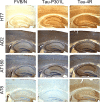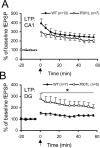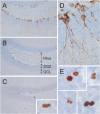Improved long-term potentiation and memory in young tau-P301L transgenic mice before onset of hyperphosphorylation and tauopathy
- PMID: 16571759
- PMCID: PMC6673867
- DOI: 10.1523/JNEUROSCI.5425-05.2006
Improved long-term potentiation and memory in young tau-P301L transgenic mice before onset of hyperphosphorylation and tauopathy
Abstract
The microtubule binding protein tau is implicated in neurodegenerative tauopathies, including frontotemporal dementia (FTD) with Parkinsonism caused by diverse mutations in the tau gene. Hyperphosphorylation of tau is considered crucial in the age-related formation of neurofibrillary tangles (NFTs) correlating well with neurotoxicity and cognitive defects. Transgenic mice expressing FTD mutant tau-P301L recapitulate the human pathology with progressive neuronal impairment and accumulation of NFT. Here, we studied tau-P301L mice for parameters of learning and memory at a young age, before hyperphosphorylation and tauopathy were apparent. Unexpectedly, in young tau-P301L mice, increased long-term potentiation in the dentate gyrus was observed in parallel with improved cognitive performance in object recognition tests. Neither tau phosphorylation, neurogenesis, nor other morphological parameters that were analyzed could account for these cognitive changes. The data demonstrate that learning and memory processes in the hippocampus of young tau-P301L mice are not impaired and actually improved in the absence of marked phosphorylation of human tau. We conclude that protein tau plays an important beneficial role in normal neuronal processes of hippocampal memory, and conversely, that not tau mutations per se, but the ensuing hyperphosphorylation must be critical for cognitive decline in tauopathies.
Figures







Similar articles
-
A novel transgenic mouse expressing double mutant tau driven by its natural promoter exhibits tauopathy characteristics.Exp Neurol. 2008 Jul;212(1):71-84. doi: 10.1016/j.expneurol.2008.03.007. Epub 2008 Mar 21. Exp Neurol. 2008. PMID: 18490011
-
Changed conformation of mutant Tau-P301L underlies the moribund tauopathy, absent in progressive, nonlethal axonopathy of Tau-4R/2N transgenic mice.J Biol Chem. 2005 Feb 4;280(5):3963-73. doi: 10.1074/jbc.M409876200. Epub 2004 Oct 27. J Biol Chem. 2005. PMID: 15509565
-
The GABAergic septohippocampal connection is impaired in a mouse model of tauopathy.Neurobiol Aging. 2017 Jan;49:40-51. doi: 10.1016/j.neurobiolaging.2016.09.006. Epub 2016 Sep 15. Neurobiol Aging. 2017. PMID: 27743524
-
Zebrafish Models to Study New Pathways in Tauopathies.Int J Mol Sci. 2021 Apr 28;22(9):4626. doi: 10.3390/ijms22094626. Int J Mol Sci. 2021. PMID: 33924882 Free PMC article. Review.
-
Transgenic mouse models of tauopathy in drug discovery.CNS Neurol Disord Drug Targets. 2010 Aug;9(4):403-28. doi: 10.2174/187152710791556131. CNS Neurol Disord Drug Targets. 2010. PMID: 20522014 Review.
Cited by
-
Synaptic alterations in the rTg4510 mouse model of tauopathy.J Comp Neurol. 2013 Apr 15;521(6):1334-53. doi: 10.1002/cne.23234. J Comp Neurol. 2013. PMID: 23047530 Free PMC article.
-
Individual variations in maternal care early in life correlate with later life decision-making and c-fos expression in prefrontal subregions of rats.PLoS One. 2012;7(5):e37820. doi: 10.1371/journal.pone.0037820. Epub 2012 May 31. PLoS One. 2012. PMID: 22693577 Free PMC article.
-
Corticosterone time-dependently modulates beta-adrenergic effects on long-term potentiation in the hippocampal dentate gyrus.Learn Mem. 2007 May 3;14(5):359-67. doi: 10.1101/lm.527207. Print 2007 May. Learn Mem. 2007. PMID: 17522027 Free PMC article.
-
Tangles, Toxicity, and Tau Secretion in AD - New Approaches to a Vexing Problem.Front Neurol. 2013 Oct 21;4:160. doi: 10.3389/fneur.2013.00160. Front Neurol. 2013. PMID: 24151487 Free PMC article. Review.
-
Positron Emission Computed Tomography Imaging of Synaptic Vesicle Glycoprotein 2A in Alzheimer's Disease.Front Aging Neurosci. 2021 Nov 2;13:731114. doi: 10.3389/fnagi.2021.731114. eCollection 2021. Front Aging Neurosci. 2021. PMID: 34795573 Free PMC article. Review.
References
-
- Alfarez DN, Joels M, Krugers HJ (2003). Chronic unpredictable stress impairs long-term potentiation in rat hippocampal CA1 area and dentate gyrus in vitro. Eur J Neurosci 17:1928–1934. - PubMed
-
- Andorfer C, Davies P (2000). PKA phosphorylation on tau: developmental studies in the mouse. Dev Neurosci 4:303–309. - PubMed
-
- Angelo M, Plattner F, Irvine EE, Giese KP (2003). Improved reversal learning and altered fear conditioning in transgenic mice with regionally restricted p25 expression. Eur J Neurosci 18:423–431. - PubMed
-
- Arendash GW, Lewis J, Leighty RE, McGowan E, Cracchiolo JR, Hutton M, Garcia MF (2004). Multi-metric behavioral comparison of APPsw and P301L models for Alzheimer's disease: linkage of poorer cognitive performance to tau pathology in forebrain. Brain Res 1012:29–41. - PubMed
Publication types
MeSH terms
Substances
LinkOut - more resources
Full Text Sources
Other Literature Sources
Medical
Molecular Biology Databases
